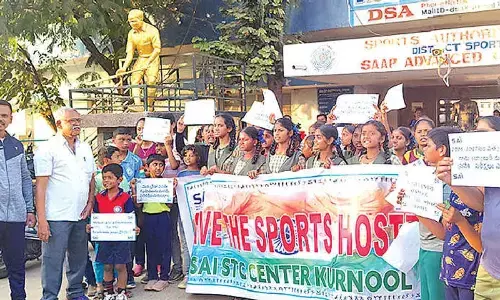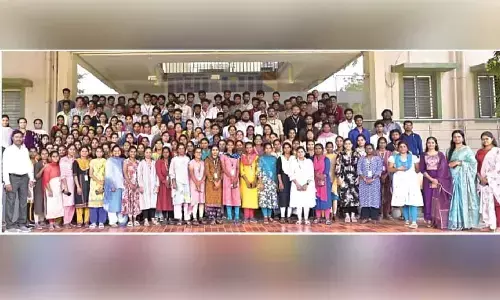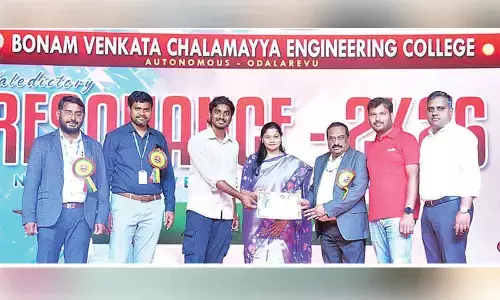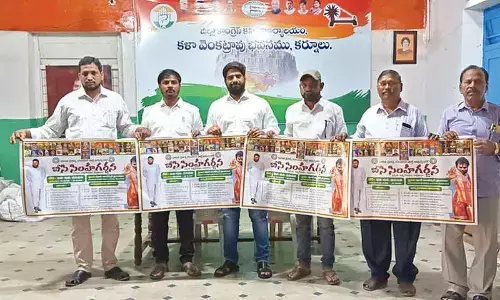A fresh take on approaching competitive exams

It’s very important to understand the difference between pressure and progress. Success in competitive exams should be pursued with determination, but never at the cost of a student’s mental and physical health. After all, the goal is not just to crack the exam, but to emerge as a well-rounded individual prepared for future challenges. Currently the focus should be on cultivating a mindset that prioritizes innovation, adaptability, and clarity, ensuring that students stand out in a competitive landscape with an edge that truly matters
The very mention of competitive exams brings a wave of anxiety among students. From sleepless nights to constant worry about results, these exams create a deep fear in young minds. Most students feel overwhelmed by the vast syllabus, tough questions, and pressure to perform well. Parents’ expectations and the fierce race for limited seats add to this stress. Despite their best efforts, many students find themselves nervous and scared when facing these important tests. However, with proper guidance and preparation, this fear can be turned into motivation to achieve success.
The Psychology of Preparation
Success in competitive exams stems from understanding that the mind works like a sophisticated processing unit rather than a storage device. High achievers often report that their breakthrough moments came when they stopped treating exams as memory tests and started viewing them as problem-solving adventures. The brain naturally retains information better when it processes concepts through practical applications and real-world connections.
Major Competitive Examinations in India
Joint Entrance Examination (JEE)
Exam Dates:
Session 1: January 22nd to January 31st, 2025
Session 2: April 1st to April 8th, 2025
Eligibility: MPC (Mathematics, Physics, Chemistry) inter students
Core Areas of Focus:
Physics: Mechanics, Thermodynamics, Electromagnetism, Modern Physics
Chemistry: Physical Chemistry, Organic Chemistry, Inorganic Chemistry
Mathematics: Calculus, Algebra, Coordinate Geometry, Trigonometry
Key Preparation Tips:
1. Master NCERT Books thoroughly
2. Select appropriate reference books
3. Utilize online learning resources
4. Maintain daily revision routine
5. Practice previous year questions
6. Take regular mock tests
7. Create concise revision notes
8. Maintain a positive mindset
National Eligibility cum Entrance Test (NEET)
Exam Date: May 2025
Eligibility: BiPC (Biology, Physics, Chemistry) Inter Students
Core Areas of Focus:
Biology: Zoology and Botany with emphasis on human physiology and plant systems
Physics: Fundamental concepts with biological applications
Chemistry: Organic compounds, biochemistry, and general principles
Key Preparation Tips:
1. Focus on NCERT Books
2. Conduct regular strength-weakness analysis
3. Maintain comprehensive notes
4. Practice previous year papers
5. Take mock tests regularly
6. Create concise study materials
7. Ensure thorough topic understanding
Graduate Aptitude Test in Engineering (GATE)
Exam Dates: February 1st, 2nd, 5th, and 16th, 2025
Eligibility: Final or pre-final year engineering students from any branch
Key Preparation Tips:
1. Begin preparation early
2. Master syllabus thoroughly
3. Take regular mock tests
4. Solve previous year papers
5. Use quality reference materials
6. Focus on high-weightage topics
7. Understand topic-wise weightage
Common Admission
Test (CAT)
Exam Dates: November 5th to 24th, 2025
Eligibility: Graduates interested in pursuing MBA
Key Preparation Tips:
1. Understand exam pattern and syllabus thoroughly
2. Develop personalized study plan
3. Emphasize Verbal Ability and Reading Comprehension
4. Practice with mock tests
5. Focus on high-scoring sections
6. Master quick passage reading techniques
Strategic Resource Utilization
Study Materials
NCERT textbooks (mandatory foundation)
Standard reference books for each subject
Previous years’ question papers
Online learning platforms
Quality study guides and solved examples
Digital Age Preparation
Modern preparation techniques harness the power of technology without becoming overwhelmed by it. Successful candidates have discovered that micro-learning sessions, spread throughout the day, can be more effective than marathon study sessions. Digital flashcards, concept maps, and interactive quizzes serve as powerful tools when integrated strategically into study routines.
Performance Enhancement Techniques
Speed Building:
Timed practice sessions
Quick calculation methods
Formula recall exercises
Pattern recognition training
Accuracy Improvement:
Double-checking crucial steps
Understanding common mistakes
Developing verification methods
Practice with similar question types
Health and Performance Optimization
Physical Wellness:
Balanced diet rich in brain-boosting nutrients
Regular exercise routine
Adequate sleep schedule
Stress management techniques
Mental Preparation:
Meditation and focus exercises
Time-bound practice sessions
Regular breaks between studies
Positive reinforcement techniques
Final Phase Preparation
Last Month Strategy:
Revision of complete syllabus
Focus on high-yield topics
Mock test analysis
Stress management techniques
Time management practice
Examination Day Preparation:
Center location verification
Required document arrangement
Time management strategy
Stress control techniques
It’s very important to understand the difference between pressure and progress. Success in competitive exams should be pursued with determination, but never at the cost of a student’s mental and physical health.
After all, the goal is not just to crack the exam, but to emerge as a well-rounded individual prepared for future challenges.
Currently the focus should be on cultivating a mindset that prioritizes innovation, adaptability, and clarity, ensuring that students stand out in a competitive landscape with an edge that truly matters.
Remember, The greatest breakthrough often comes not from pushing harder within the old boundaries, but from breaking those boundaries altogether. Your success story doesn’t have to look like anyone else’s and that’s exactly what makes it powerful.
(The author is Founder & CEO of Student Tribe)











